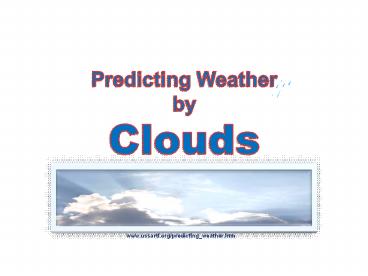Predicting Weather by Clouds - PowerPoint PPT Presentation
Title:
Predicting Weather by Clouds
Description:
... speed weather vanes to measure wind direction weather satellites, rockets, radar Meteorologists use anemometers to measure wind speed. – PowerPoint PPT presentation
Number of Views:462
Avg rating:3.0/5.0
Title: Predicting Weather by Clouds
1
Predicting WeatherbyClouds
www.ussartf.org/predicting_weather.htm
2
What is Weather
Weather is the wind, temperature, humidity,
atmospheric pressure, cloudiness, and
precipitation.
3
Predicting Weather
- The instruments used to measure and predict the
weather include - Barometer to measure humidity
- Anemometers to measure wind speed
- weather vanes to measure wind direction
- weather satellites, rockets, radar
4
Anemometer
- Meteorologists use anemometers to measure wind
speed.
5
Weather vane
- Wind vanes tell you from which direction the wind
is blowing. - Knowing where the wind is coming from might give
you clues to the temperature and the amount of
water in the air www.geographyhigh.connectfree.co.
uk/wd1.gif moving into an area.
6
Nimbus - Weather Satellite
- WEATHER SATELLITES are used to photograph and
track large-scale air movements. Then
meteorologists compile and analyze the data with
the help of computers.
- abyss.uoregon.edu/js/images/nimbus1.gif
abyss.uoregon.edu/js/images/nimbus1.gif
7
Weather Radar
- Radar is an electronic instrument, which
determines the direction and distance of objects
that reflect radio energy back to the radar site.
It stands for Radio Detection and Ranging.
www.weather.gov.hk/wservice/tsheet/radmet1.jpg
8
Forecasting the Weather
- Weather forecasting can be as simple as
observation. - You can look up at the clouds.
- Clouds can tell you many things about what the
weather will do - High, wispy clouds usually mean good weather.
- Overcast sky means rain or snow is on the way.
9
Cloud Classification
Cloud Classification
- Clouds are generally classified based on
characteristics, such as, altitude, appearance,
or origin. Altitude distinctions apply to those
clouds that fit in various layers of the
atmosphere as follows - high clouds - have bases above 18,000 feet
- middle clouds - have bases between 7,000 and
18,000 feet - low clouds - have bases below 7,000 feet
10
http//interactive.usc.edu/members/jchen/cloudchar
t.gif
11
Cumulus clouds
- Cumulus clouds are puffy.
- They have flat bottoms and are low in the sky.
- Cumulus clouds usually mean fair weather.
- If they grow tall, they can become thunderheads
and bring rain.
12
Cirrus clouds
- Cirrus clouds are the highest clouds.
- They usually mean fair weather.
- Cirrus clouds look white and feathery.
http//www.weatherwizkids.com/cloud.htmScience/clo
uds650.JPG
13
Stratus clouds
- Stratus clouds are the low clouds.
- Fog is a stratus cloud at ground level.
- They look like a low gray blanket.
- Stratus clouds bring rain or snow.
arm2.static.flickr.com/1030http//www.weatherwizki
d
14
http//www.houghtonmifflinbooks.com/booksellers/pr
ess_release/studentscience/gif/watercycle1.gif
- Clouds are an important part of the water cycle.
- The water cycle is the movement of water from
the Earth into the sky and then back down to
Earth again.
15
Why are clouds white?
Clouds are white because they reflect the light
of the sun. Light is made up of colors of the
rainbow and when you add them all together you
get white.
16
Why do clouds turn grays
- If the clouds get thick enough or high enough all
the light above does not make it through, and
that makes it look shady and gray. - If there are lots of other clouds around, their
shadow can add to the gray or multicolored gray
appearance
www.watercolorways.com
17
Classroom Weather Station
18
(No Transcript)
19
(No Transcript)
20
(No Transcript)
21
(No Transcript)
22
(No Transcript)
23
(No Transcript)
24
(No Transcript)

